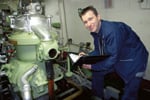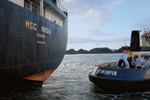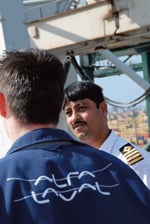Shipshape support
The condition of the machinery onboard has a major impact on a ship’s overall performance and running costs. Regular examination and loving care is needed to keep it in top form.
DATE 2023-11-28 AUTHOR Alexander FarnsworthAlfa Laval Service Engineer Sven Floryn likes to visit ships
Based in Breda in the Netherlands, Floryn’s job entails boarding ships in either Antwerp or Rotterdam, two of the largest ports in the world, and paying a courtesy visit to chief engineers to listen to what they have to say about Alfa Laval’s machinery onboard. This support is very much appreciated.
Typical topics of conversation include preventive maintenance, service bulletins, upgrading of machinery, advice on how to improve performance, and the density of bunker fuel.
“Many vessels that are older than 15 years still have separators of an earlier generation. These separators were developed before today’s fuel oil of the heavy – and less expensive – kind was used which requires more advanced separation technology,” says Floryn. “Therefore, our customers have to choose from using more expensive fuel oil or upgrading to the new generation of separators that can handle fuels with densities up 1010 kg/m3 at 15°C. Most of the time they choose the latter option which results in greater reliability as well.”
 Often, Floryn crawls through engine rooms, notebook in hand, together with a ship’s engineer to get a grip on how Alfa Laval equipment is running. “We are always open to this kind of help. And it feels good to know that someone is thinking of us,” says Mirko Vukasovic, Chief Engineer of the MSC Monica container ship laid up in an Antwerp dry dock for essential repairs and maintenance.
Often, Floryn crawls through engine rooms, notebook in hand, together with a ship’s engineer to get a grip on how Alfa Laval equipment is running. “We are always open to this kind of help. And it feels good to know that someone is thinking of us,” says Mirko Vukasovic, Chief Engineer of the MSC Monica container ship laid up in an Antwerp dry dock for essential repairs and maintenance.
Worldwide coverage
MSC, or Mediterranean Shipping Company, is the world’s second biggest container shipping line with 288 ships plying the world’s oceans. MSC has 350 dedicated local offices around the world to support its ships. The company employs 28,000 people.
MSC is one of the few carriers able to offer worldwide coverage with one MSC bill of lading, allowing the rapid movement of goods through dedicated trans-shipment hubs. MSC serves 215 ports.
Based in Geneva, Switzerland with subsidiaries in Hong Kong, China and Sorrento, Italy, MSC is a privately-owned shipping company and was founded in 1970.
"I don’t know of many other companies that provide this kind of service in the port of Antwerp," says Sudhakar Tripathi, superintendent in Antwerp for MSC Ship Management Hong Kong. "Sven always finds us to survey our ships and offer advice. And we mostly do what he says. It helps us keep our costs down in a major way."
"I am really more of a support engineer," comments Floryn, dressed in an Alfa Laval uniform. Floryn’s visits typically last between five minutes and a half a day. "I advise the engineers on how to get the best performance out of their equipment. I check the condition of their equipment, and if, for example, their fuel oil temperature in the purifier system is running at 85°C, I’ll explain to them why separating at 98°C is much better."
 Alfa Laval equipment can be found on two thirds of the world’s commercial ships. This equipment includes fuel oil, lubricating oil and oily waste water separators, fresh water generators, filters, heat exchangers and tank cleaning equipment that are used onboard all types of vessels to perform vital functions in the smooth running of the ships. Because everything is interconnected in a ship’s engine room, the condition of an oil separator, for example, can influence the performance of the main engines and generators – a point Floryn repeats like a mantra.
Alfa Laval equipment can be found on two thirds of the world’s commercial ships. This equipment includes fuel oil, lubricating oil and oily waste water separators, fresh water generators, filters, heat exchangers and tank cleaning equipment that are used onboard all types of vessels to perform vital functions in the smooth running of the ships. Because everything is interconnected in a ship’s engine room, the condition of an oil separator, for example, can influence the performance of the main engines and generators – a point Floryn repeats like a mantra.
The important messenger
In the past two years, Alfa Laval has put greater focus on spontaneous or courtesy visits by service engineers in the most frequently-visited ports. This means increasing the existing harbour support facilities and the service to marine clients with regular ship visits by service engineers like Floryn.
Of course, service engineers are present in all major large ports around the world to perform whatever service or repairs a ship might need. Floryn however, seldom performs maintenance on Alfa Laval machinery. He is a messenger.
Floryn’s main task is to ensure the run-ability of Alfa Laval equipment aboard ships. When visiting a ship, Floryn writes a report on the status of the machinery that gets sent to the shipping company. His reports also get uploaded to an Alfa Laval internal database so that Alfa Laval sales companies around the world can access the information, and follow up with ideas on how to improve operations onboard.
"My job is about keeping Alfa Laval and the customers’ superintendents informed about the status of our machinery on ships," says Floryn.
Valued tools
In his daily work, Floryn uses a couple of online tools to determine which ships to visit. www.Shipmovements.nl and www.shipreporting.net give exact in-formation about a ship’s location, management, owner, port of call, agent, and which port a ship hails from. These tools even show where the ship is berthed, and can alert Floryn by SMS or e-mail when it arrives.
Another tool is Alfa Laval’s own ACE Global Shipmaster, a complete register of all vessels and of the Alfa Laval equipment installed in them. So, with the help of these tools, Floryn can make a cold call to a ship when it comes into port. "They help me plan my day around which ships are coming in," he says.
But Floryn doesn’t just pay visits to companies with hundreds of ships. On a recent day in April 2006, the Al Esraa general cargo vessel from Egypt, operated by FAMCO, or the Federal Arab Maritime Corporation, was in Antwerp unloading and loading cargo. FAMCO operates three cargo vessels. During its week-long stay, the Al Esraa received a fuel oil separator, to replace a malfunctioning separator from another supplier. Alfa Laval service engineers installed it.
"We’ve replaced three separators on each of FAMCO’s ships," says Floryn, proudly. "And all three were installed due the recommendations made on our courtesy visits to their ships."
A close-knit relationship
Alfa Laval has a long relationship with MSC Hong Kong that operates 82 container ships. MSC Hong Kong is a subsidiary of MSC based in Geneva.
The need for transport capacity is increasing in pace with the continuously growing trade. MSC Hong Kong and Alfa Laval work closely with a comprehensive upgrading and service programme to keep the ships and the equipment on board at peak performance. According to Hubert Lee, Alfa Laval’s Parts & Service Regional Sales Manager, MSC Hong Kong will take over four more ships by the end of May 2006 and a further 20 during the coming year, many of them with Alfa Laval equipment onboard.
Alfa Laval service engineers in Sydney, Dubai, Singapore and Antwerp look after Alfa Laval equipment on MSC Hong Kong’s fleet.
"We have a very good relationship with MSC Hong Kong," says Lee. "We have a continuous dialogue about the situation onboard their ships, the performance of our equipment as well as ongoing and potential projects.

